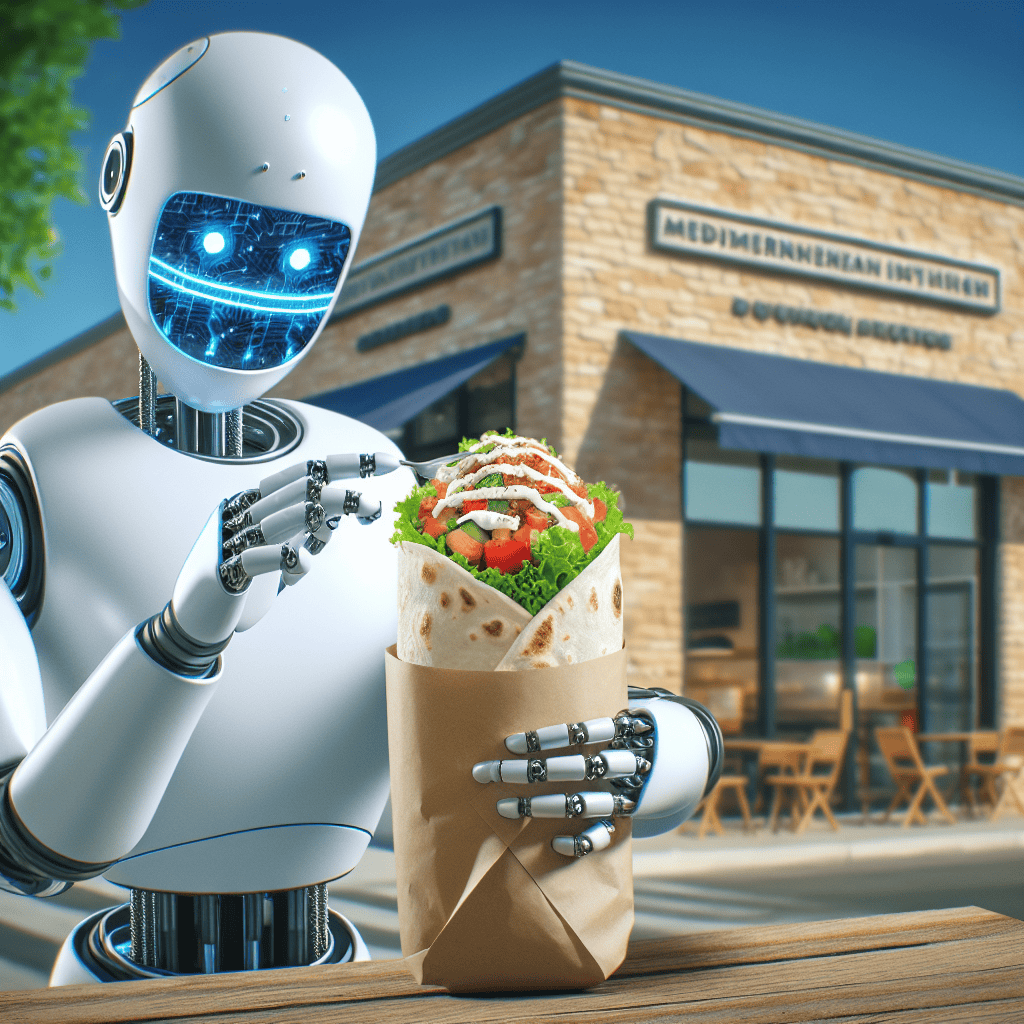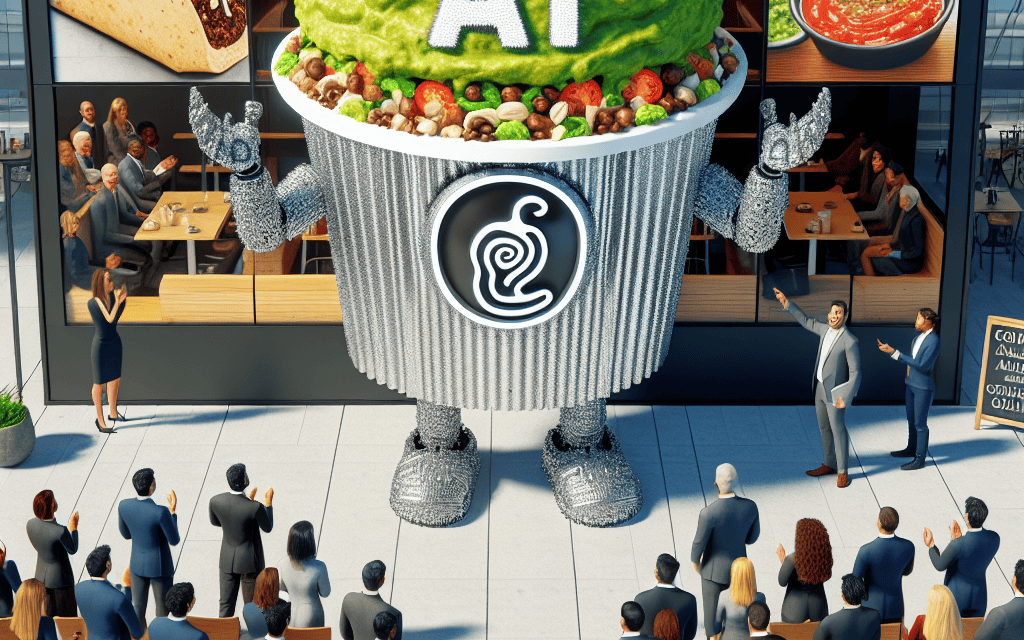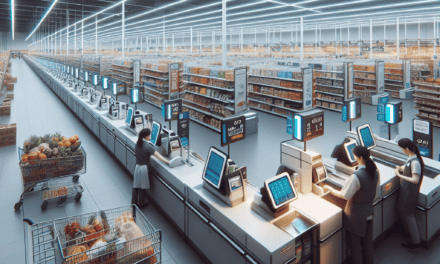“Chipotle Fuels the Future: Investing in AI to Spice Up the Competition with CAVA.”
Introduction
Chipotle Mexican Grill, a leading name in the fast-casual dining sector, has announced strategic investments in artificial intelligence (AI) technology, marking a significant step in its ongoing efforts to enhance operational efficiency and customer experience. This move positions Chipotle at the forefront of technological innovation within the restaurant industry, as it seeks to leverage AI to streamline operations, optimize supply chain management, and personalize customer interactions. Additionally, Chipotle’s investment strategy includes a focus on emerging competitors such as CAVA, a Mediterranean fast-casual chain, highlighting its commitment to maintaining a competitive edge in a rapidly evolving market. Through these investments, Chipotle aims to not only improve its service offerings but also to set new standards for technological integration in the dining experience.
Chipotle’s Strategic AI Investments: A Game Changer in the Fast-Casual Industry
Chipotle Mexican Grill, a leader in the fast-casual dining sector, has recently announced a significant investment in artificial intelligence (AI) technology, marking a pivotal moment in the industry. This strategic move is not only aimed at enhancing operational efficiency but also at maintaining a competitive edge against emerging rivals such as CAVA. As the fast-casual market becomes increasingly saturated, Chipotle’s decision to integrate AI into its operations underscores the company’s commitment to innovation and customer satisfaction.
The integration of AI technology into Chipotle’s operations is expected to streamline various aspects of the business, from supply chain management to customer service. By leveraging AI, Chipotle aims to optimize inventory management, reducing waste and ensuring that ingredients are always fresh and available. This technological advancement will enable the company to predict demand more accurately, thereby minimizing shortages and overstock situations. Consequently, this will lead to cost savings and improved profitability, which are crucial in maintaining a competitive position in the fast-casual dining landscape.
Moreover, AI’s role in enhancing customer experience cannot be overstated. Chipotle plans to utilize AI-driven analytics to gain deeper insights into customer preferences and behaviors. This data-driven approach will allow the company to tailor its menu offerings and marketing strategies to better meet the needs of its diverse customer base. By personalizing the dining experience, Chipotle hopes to foster greater customer loyalty and attract new patrons, particularly those who are tech-savvy and value convenience.
In addition to operational efficiencies and customer engagement, Chipotle’s investment in AI is also a strategic response to the growing competition from CAVA, a Mediterranean fast-casual chain that has been gaining traction in recent years. CAVA’s emphasis on healthy, customizable meals has resonated with health-conscious consumers, posing a challenge to Chipotle’s market share. By adopting AI technology, Chipotle aims to differentiate itself from competitors like CAVA by offering a more seamless and personalized dining experience.
Furthermore, Chipotle’s commitment to sustainability aligns with its AI initiatives. The company has long been an advocate for sustainable sourcing and environmentally friendly practices. Through AI, Chipotle can enhance its sustainability efforts by optimizing energy usage in its restaurants and reducing its carbon footprint. This not only appeals to environmentally conscious consumers but also positions Chipotle as a responsible corporate citizen in an era where sustainability is increasingly important.
As Chipotle embarks on this AI-driven journey, it is essential to acknowledge the potential challenges that may arise. Implementing AI technology requires significant investment in infrastructure and training, as well as a cultural shift within the organization. However, Chipotle’s track record of embracing innovation suggests that the company is well-equipped to navigate these challenges and emerge stronger.
In conclusion, Chipotle’s strategic investment in AI technology represents a game-changing development in the fast-casual industry. By enhancing operational efficiency, personalizing customer experiences, and reinforcing its commitment to sustainability, Chipotle is poised to maintain its leadership position in the market. As the company continues to innovate and adapt to changing consumer preferences, its AI initiatives will undoubtedly play a crucial role in shaping the future of fast-casual dining. Through these efforts, Chipotle not only sets a benchmark for its competitors but also reaffirms its dedication to delivering exceptional value to its customers.
How Chipotle’s AI Initiatives Could Impact CAVA and Other Competitors
Chipotle Mexican Grill, a leader in the fast-casual dining sector, has recently announced significant investments in artificial intelligence (AI) technologies, a move that could have profound implications for its competitors, including CAVA. As the restaurant industry increasingly embraces digital transformation, Chipotle’s strategic focus on AI underscores its commitment to enhancing operational efficiency, improving customer experience, and maintaining a competitive edge. This development is particularly noteworthy for CAVA, a Mediterranean fast-casual chain that has been gaining traction in the market.
Chipotle’s investment in AI is multifaceted, aiming to streamline various aspects of its operations. One of the primary areas of focus is supply chain optimization. By leveraging AI algorithms, Chipotle can predict demand more accurately, reduce food waste, and ensure that ingredients are always fresh and available. This level of precision not only reduces costs but also enhances the quality of the customer experience, as patrons are less likely to encounter stockouts or subpar ingredients. For competitors like CAVA, which also rely heavily on fresh ingredients, this could mean increased pressure to adopt similar technologies to remain competitive.
Moreover, Chipotle is exploring AI-driven solutions to personalize the customer experience. Through data analytics and machine learning, the company can offer tailored recommendations and promotions to individual customers based on their past orders and preferences. This personalized approach can significantly enhance customer satisfaction and loyalty, providing Chipotle with a distinct advantage in a crowded market. CAVA and other competitors may find it challenging to match this level of personalization without similar investments in AI technology.
In addition to supply chain and customer experience enhancements, Chipotle is also investing in AI to improve labor efficiency. Automated systems can assist with tasks such as scheduling, inventory management, and even food preparation, allowing staff to focus on more complex and customer-facing activities. This not only improves operational efficiency but also reduces labor costs, a critical factor in the restaurant industry’s tight-margin environment. For CAVA, which operates on a similar business model, the pressure to adopt AI-driven labor solutions could intensify as Chipotle reaps the benefits of these efficiencies.
Furthermore, Chipotle’s AI initiatives extend to enhancing food safety protocols. By utilizing AI to monitor and analyze data from various sources, the company can quickly identify potential food safety issues and take proactive measures to address them. This capability is crucial in maintaining consumer trust and avoiding costly recalls or reputational damage. Competitors like CAVA must consider the implications of Chipotle’s advancements in this area, as food safety remains a top priority for consumers.
As Chipotle continues to invest in AI, the ripple effects on the fast-casual dining sector are likely to be significant. Competitors, including CAVA, will need to evaluate their own technological capabilities and consider similar investments to keep pace. While AI offers numerous benefits, it also requires substantial resources and expertise, which may pose challenges for smaller or less technologically advanced competitors. However, those that can successfully integrate AI into their operations stand to gain a competitive advantage in an increasingly digital landscape.
In conclusion, Chipotle’s commitment to AI investment represents a strategic move that could reshape the competitive dynamics of the fast-casual dining industry. As the company leverages AI to enhance supply chain efficiency, personalize customer experiences, improve labor productivity, and bolster food safety, competitors like CAVA must adapt to these changes or risk falling behind. The future of the industry will likely be defined by those who can effectively harness the power of AI to meet evolving consumer expectations and operational demands.
The Role of Artificial Intelligence in Revolutionizing Chipotle’s Customer Experience
Chipotle Mexican Grill, a prominent player in the fast-casual dining sector, has recently announced a strategic investment in artificial intelligence (AI) technologies, aiming to revolutionize its customer experience. This move comes as part of a broader initiative to enhance operational efficiency and maintain a competitive edge against emerging rivals such as CAVA, a Mediterranean fast-casual chain that has been gaining traction in the market. By integrating AI into its operations, Chipotle seeks to streamline various aspects of its business, from order processing to customer engagement, thereby setting a new standard in the industry.
To begin with, Chipotle’s investment in AI is expected to significantly improve the speed and accuracy of its order processing system. By employing machine learning algorithms, the company can better predict customer preferences and optimize inventory management. This not only reduces wait times for customers but also minimizes food waste, aligning with Chipotle’s commitment to sustainability. Furthermore, AI-driven analytics can provide valuable insights into consumer behavior, enabling the company to tailor its menu offerings and marketing strategies more effectively.
In addition to enhancing operational efficiency, Chipotle’s AI initiatives are poised to transform the customer experience through personalized interactions. By leveraging data collected from various touchpoints, AI can help create a more customized dining experience for each customer. For instance, digital kiosks equipped with AI technology can suggest menu items based on previous orders or dietary preferences, thereby enhancing customer satisfaction. Moreover, AI-powered chatbots can provide real-time assistance, addressing customer inquiries and resolving issues promptly, which further elevates the overall dining experience.
As Chipotle embraces AI, it also acknowledges the importance of maintaining a human touch in its customer interactions. While technology can significantly enhance efficiency and personalization, the company recognizes that the essence of hospitality lies in genuine human connections. Therefore, Chipotle is committed to training its staff to work alongside AI tools, ensuring that employees can focus on delivering exceptional service while technology handles routine tasks. This harmonious integration of AI and human expertise is expected to create a seamless and enjoyable experience for customers.
In the context of competition, Chipotle’s investment in AI is a strategic response to the growing presence of CAVA and other fast-casual competitors. CAVA, known for its innovative approach to Mediterranean cuisine, has been expanding rapidly, attracting a diverse customer base with its fresh ingredients and customizable menu options. By adopting AI technologies, Chipotle aims to differentiate itself in the crowded market, offering a unique blend of convenience, personalization, and quality that appeals to modern consumers.
Moreover, Chipotle’s focus on AI aligns with broader industry trends, as many foodservice companies are increasingly turning to technology to enhance their operations. The integration of AI in the restaurant industry is not merely a passing trend but a fundamental shift that is reshaping how businesses interact with customers. As such, Chipotle’s proactive approach positions it as a leader in this technological revolution, setting a benchmark for others to follow.
In conclusion, Chipotle’s investment in AI represents a significant step forward in its quest to redefine the customer experience. By harnessing the power of technology, the company aims to deliver faster, more personalized service while maintaining its commitment to quality and sustainability. As the fast-casual dining landscape continues to evolve, Chipotle’s strategic embrace of AI ensures that it remains at the forefront of innovation, ready to meet the changing needs and expectations of its customers.
Chipotle’s AI Investment: A Step Towards Enhanced Operational Efficiency

Chipotle Mexican Grill, a prominent player in the fast-casual dining sector, has recently announced a significant investment in artificial intelligence (AI) technology, marking a strategic move towards enhancing its operational efficiency. This decision comes at a time when the restaurant industry is increasingly embracing technological advancements to streamline operations, improve customer experience, and maintain a competitive edge. By integrating AI into its operations, Chipotle aims to optimize various aspects of its business, from supply chain management to customer service, thereby setting a new standard in the industry.
The implementation of AI technology in Chipotle’s operations is expected to bring about transformative changes. One of the primary areas where AI can make a substantial impact is in supply chain management. By leveraging AI algorithms, Chipotle can predict demand more accurately, ensuring that ingredients are always fresh and available. This not only reduces waste but also enhances the quality of the food served to customers. Furthermore, AI can assist in identifying patterns and trends in customer preferences, enabling Chipotle to tailor its menu offerings more effectively and introduce new items that align with consumer tastes.
In addition to supply chain optimization, AI technology can significantly improve the customer experience at Chipotle. For instance, AI-driven chatbots can be employed to handle customer inquiries and orders, providing quick and efficient service. This not only reduces wait times but also allows staff to focus on more complex tasks, thereby improving overall service quality. Moreover, AI can be used to personalize marketing efforts, ensuring that customers receive relevant promotions and recommendations based on their previous interactions with the brand.
As Chipotle invests in AI, it is also mindful of the competitive landscape, particularly with the rise of CAVA, a Mediterranean fast-casual chain that has been gaining traction. CAVA’s emphasis on healthy, customizable meals has resonated with health-conscious consumers, posing a challenge to Chipotle’s market share. By adopting AI technology, Chipotle aims to differentiate itself from competitors like CAVA, offering a more efficient and personalized dining experience that appeals to a broad audience.
Furthermore, Chipotle’s investment in AI aligns with broader industry trends, as many restaurant chains are turning to technology to address labor shortages and rising operational costs. By automating routine tasks and optimizing resource allocation, AI can help Chipotle mitigate these challenges, ensuring sustainable growth in a competitive market. This strategic move not only enhances Chipotle’s operational efficiency but also positions the company as a leader in technological innovation within the fast-casual dining sector.
In conclusion, Chipotle’s investment in AI technology represents a forward-thinking approach to enhancing operational efficiency and customer experience. By leveraging AI to optimize supply chain management, personalize customer interactions, and streamline operations, Chipotle is poised to maintain its competitive edge in the fast-casual dining industry. As the company continues to innovate and adapt to changing consumer preferences, its commitment to technological advancement will undoubtedly play a crucial role in its ongoing success. This strategic investment not only sets Chipotle apart from competitors like CAVA but also underscores its dedication to providing high-quality, efficient service to its customers.
Comparing Chipotle and CAVA: The AI Advantage in the Fast-Casual Market
In the rapidly evolving fast-casual dining sector, Chipotle Mexican Grill has announced a significant investment in artificial intelligence (AI), positioning itself as a formidable competitor to CAVA, a Mediterranean fast-casual chain that has also been making waves in the industry. This strategic move by Chipotle underscores the growing importance of technology in enhancing operational efficiency and customer experience. As both companies vie for market dominance, understanding the role of AI in their operations provides insight into the future of the fast-casual dining experience.
Chipotle’s investment in AI is a testament to its commitment to innovation and efficiency. By integrating AI into its operations, Chipotle aims to streamline its supply chain, optimize labor costs, and enhance customer interactions. For instance, AI can predict customer preferences and adjust inventory levels accordingly, reducing waste and ensuring that popular items are always available. Moreover, AI-driven analytics can provide insights into peak dining times, allowing for better staff allocation and improved service speed. This focus on efficiency not only reduces operational costs but also enhances the overall customer experience, making Chipotle a more attractive option for diners seeking quick and reliable service.
In contrast, CAVA has also embraced technology, albeit with a slightly different focus. The Mediterranean chain has leveraged AI to personalize the dining experience, using data analytics to tailor menu recommendations based on individual customer preferences. This personalized approach not only enhances customer satisfaction but also fosters brand loyalty, as diners feel a deeper connection to a brand that understands their unique tastes. Furthermore, CAVA’s use of AI extends to its marketing strategies, where data-driven insights help craft targeted campaigns that resonate with specific demographics, thereby expanding its customer base.
While both Chipotle and CAVA utilize AI to improve their operations, the key difference lies in their strategic focus. Chipotle’s emphasis on operational efficiency and cost reduction contrasts with CAVA’s focus on personalization and customer engagement. This divergence in strategy highlights the versatility of AI in addressing different business objectives within the fast-casual market. However, it also raises questions about which approach will ultimately prove more successful in capturing market share.
As the fast-casual dining landscape becomes increasingly competitive, the integration of AI offers a distinct advantage. For Chipotle, the ability to optimize operations and reduce costs could translate into lower prices for consumers, thereby attracting a broader audience. On the other hand, CAVA’s personalized dining experience may appeal to customers seeking a more tailored and engaging interaction with their chosen brand. Ultimately, the success of these strategies will depend on how effectively each company can leverage AI to meet the evolving demands of their customer base.
In conclusion, Chipotle’s investment in AI marks a significant step in its quest to outpace competitors like CAVA in the fast-casual market. By focusing on operational efficiency, Chipotle aims to enhance its service delivery and reduce costs, while CAVA’s emphasis on personalization seeks to deepen customer engagement and loyalty. As both companies continue to innovate and refine their AI strategies, the fast-casual dining experience is poised for transformation, offering consumers a blend of efficiency and personalization that caters to their diverse preferences. The coming years will reveal which approach resonates more with diners, shaping the future of the industry.
The Future of Fast-Casual Dining: Chipotle’s AI Innovations and Industry Implications
In a bold move that underscores the rapidly evolving landscape of the fast-casual dining industry, Chipotle Mexican Grill has announced significant investments in artificial intelligence (AI) technologies. This strategic initiative aims to enhance operational efficiency, improve customer experience, and maintain a competitive edge against emerging rivals such as CAVA. As the fast-casual sector continues to grow, driven by consumer demand for quick yet high-quality dining options, Chipotle’s foray into AI represents a pivotal moment that could reshape industry standards.
To begin with, Chipotle’s investment in AI is primarily focused on optimizing its supply chain and streamlining kitchen operations. By leveraging AI algorithms, the company aims to predict demand more accurately, thereby reducing food waste and ensuring that popular menu items are always available. This predictive capability is particularly crucial in an industry where freshness and availability are key determinants of customer satisfaction. Moreover, AI-driven insights can help Chipotle identify trends and adjust its offerings accordingly, ensuring that it remains responsive to changing consumer preferences.
In addition to supply chain enhancements, Chipotle is exploring AI applications in customer service. For instance, AI-powered chatbots could be deployed to handle routine inquiries, allowing human staff to focus on more complex customer interactions. This not only improves efficiency but also enhances the overall customer experience by providing quicker and more accurate responses. Furthermore, AI can be used to personalize marketing efforts, tailoring promotions and recommendations to individual customer preferences based on their purchase history. Such targeted marketing strategies are likely to increase customer loyalty and drive sales.
As Chipotle embraces AI, it inevitably sets a benchmark for its competitors, including CAVA, a fast-casual Mediterranean chain that has been gaining traction in recent years. CAVA’s emphasis on healthy, customizable meals has resonated with health-conscious consumers, positioning it as a formidable competitor in the fast-casual space. In response, Chipotle’s AI investments could serve as a differentiator, enabling it to offer a more seamless and personalized dining experience. This technological edge may prove crucial in attracting and retaining customers in an increasingly crowded market.
Moreover, Chipotle’s commitment to AI innovation reflects broader industry trends, as fast-casual chains recognize the potential of technology to drive growth and efficiency. As more companies invest in AI, the industry is likely to witness a transformation in how restaurants operate and interact with customers. This shift could lead to the emergence of new business models, where data-driven insights play a central role in decision-making processes. Consequently, companies that fail to adapt to this technological evolution risk being left behind.
In conclusion, Chipotle’s announcement of its AI investments marks a significant development in the fast-casual dining industry. By harnessing the power of AI, Chipotle aims to enhance its operational capabilities, improve customer satisfaction, and maintain a competitive edge against rivals like CAVA. As the industry continues to evolve, the integration of AI technologies is poised to become a defining factor in determining the success of fast-casual chains. Ultimately, Chipotle’s strategic move not only positions it as a leader in innovation but also sets the stage for a new era in fast-casual dining, where technology and customer experience are inextricably linked.
Chipotle’s AI Strategy: What It Means for Investors and Market Dynamics
Chipotle Mexican Grill, a prominent player in the fast-casual dining sector, has recently announced a strategic investment in artificial intelligence (AI) technologies, signaling a significant shift in its operational and competitive strategies. This move comes at a time when the restaurant industry is increasingly embracing digital transformation to enhance customer experience, streamline operations, and drive growth. For investors, Chipotle’s foray into AI represents a forward-thinking approach that could potentially reshape market dynamics and offer new avenues for revenue generation.
The integration of AI into Chipotle’s operations is expected to bring about several transformative changes. Primarily, AI can enhance the customer experience by personalizing interactions and streamlining the ordering process. For instance, AI-driven systems can analyze customer data to offer personalized menu recommendations, thereby increasing customer satisfaction and potentially boosting sales. Moreover, AI can optimize supply chain management by predicting demand patterns and ensuring efficient inventory management, which can lead to cost savings and reduced food waste.
Furthermore, Chipotle’s investment in AI is likely to improve operational efficiency. By automating routine tasks such as order processing and inventory tracking, AI can free up staff to focus on more value-added activities, such as enhancing customer service. This not only improves the overall dining experience but also allows Chipotle to operate more efficiently, potentially leading to higher profit margins. Additionally, AI can play a crucial role in maintaining food safety standards by monitoring food quality and ensuring compliance with health regulations.
In the context of market dynamics, Chipotle’s AI strategy positions it as a formidable competitor to other fast-casual dining chains, such as CAVA. As both companies vie for market share, the adoption of AI technologies could provide Chipotle with a competitive edge. By leveraging AI to enhance operational efficiency and customer engagement, Chipotle can differentiate itself in a crowded market and attract a broader customer base. This strategic advantage could be particularly significant in urban areas where competition is fierce and consumer preferences are rapidly evolving.
For investors, Chipotle’s commitment to AI represents a promising opportunity. The potential for increased efficiency and enhanced customer experience can translate into improved financial performance and shareholder value. Moreover, as the restaurant industry continues to evolve, companies that successfully integrate AI into their operations are likely to be better positioned to adapt to changing market conditions and consumer preferences. Consequently, Chipotle’s investment in AI could be seen as a proactive measure to future-proof its business and sustain long-term growth.
However, it is important to consider the challenges associated with implementing AI technologies. The initial investment in AI infrastructure and training can be substantial, and there is a learning curve associated with integrating these technologies into existing operations. Additionally, data privacy concerns and the need for robust cybersecurity measures must be addressed to ensure the safe and ethical use of AI. Despite these challenges, the potential benefits of AI adoption are significant, and Chipotle’s strategic investment underscores its commitment to innovation and growth.
In conclusion, Chipotle’s announcement of investments in AI marks a pivotal moment in its strategic evolution. By embracing AI technologies, Chipotle aims to enhance customer experience, improve operational efficiency, and strengthen its competitive position in the fast-casual dining sector. For investors, this move represents a forward-looking strategy that could yield significant returns and reshape market dynamics. As Chipotle continues to innovate and adapt to the digital age, its commitment to AI is likely to play a crucial role in its future success.
Q&A
1. **What is the main focus of Chipotle’s recent announcement?**
Chipotle announced investments in artificial intelligence (AI) and a competitor to CAVA.
2. **Why is Chipotle investing in AI?**
Chipotle is investing in AI to enhance operational efficiency, improve customer experience, and streamline processes within their restaurants.
3. **What specific areas will AI be applied to in Chipotle’s operations?**
AI will be applied to areas such as inventory management, customer service, and personalized marketing strategies.
4. **Who is CAVA, and why is Chipotle interested in a competitor?**
CAVA is a fast-casual Mediterranean restaurant chain. Chipotle’s interest in a competitor suggests a strategic move to diversify its offerings and capture a broader market segment.
5. **How might AI impact Chipotle’s customer experience?**
AI can lead to faster service, more accurate order processing, and personalized recommendations, enhancing the overall customer experience.
6. **What potential benefits does Chipotle see in investing in a CAVA competitor?**
By investing in a CAVA competitor, Chipotle aims to expand its market presence, attract new customers, and offer a wider variety of menu options.
7. **What are the expected outcomes of these investments for Chipotle?**
The expected outcomes include increased operational efficiency, improved customer satisfaction, and potential growth in market share and revenue.
Conclusion
Chipotle’s announcement of investments in AI and its positioning as a competitor to CAVA highlights the company’s strategic focus on leveraging technology to enhance operational efficiency and customer experience. By integrating AI, Chipotle aims to streamline processes such as inventory management, personalized marketing, and customer service, potentially leading to increased profitability and market competitiveness. This move also underscores the growing trend in the fast-casual dining industry to adopt advanced technologies to meet evolving consumer demands and stay ahead of competitors like CAVA. Overall, Chipotle’s investment in AI signifies a commitment to innovation and adaptability in a rapidly changing market landscape.





